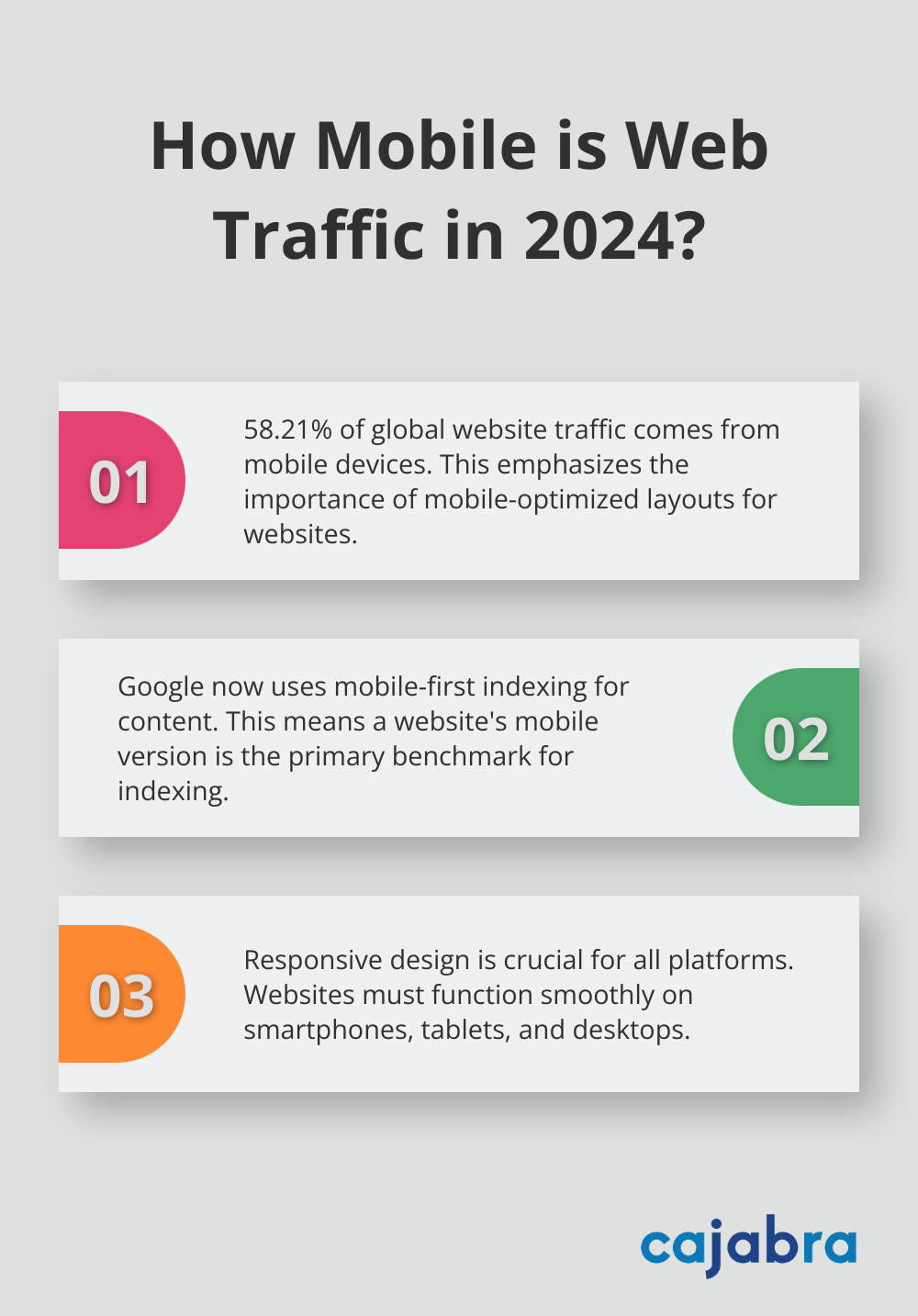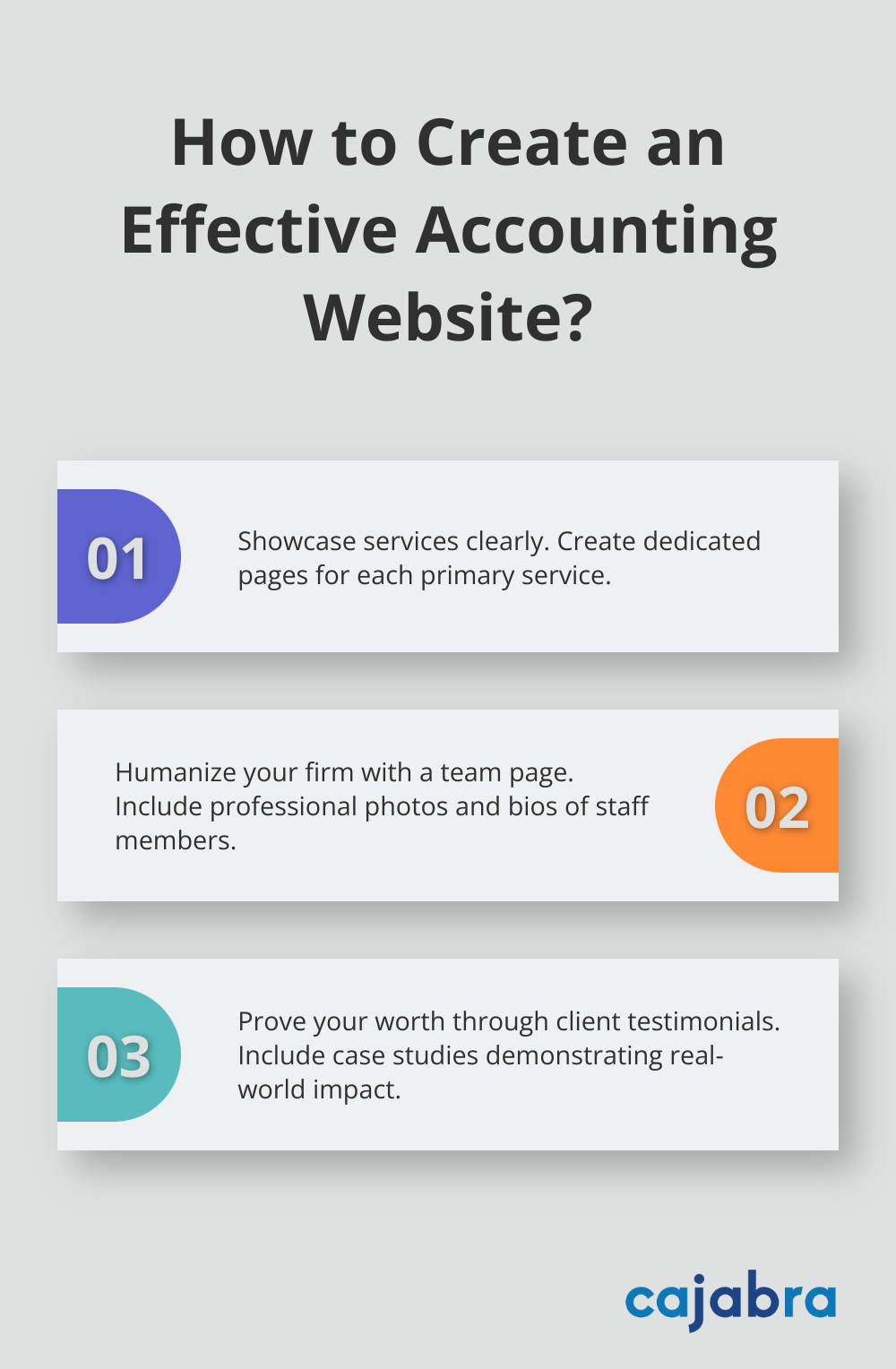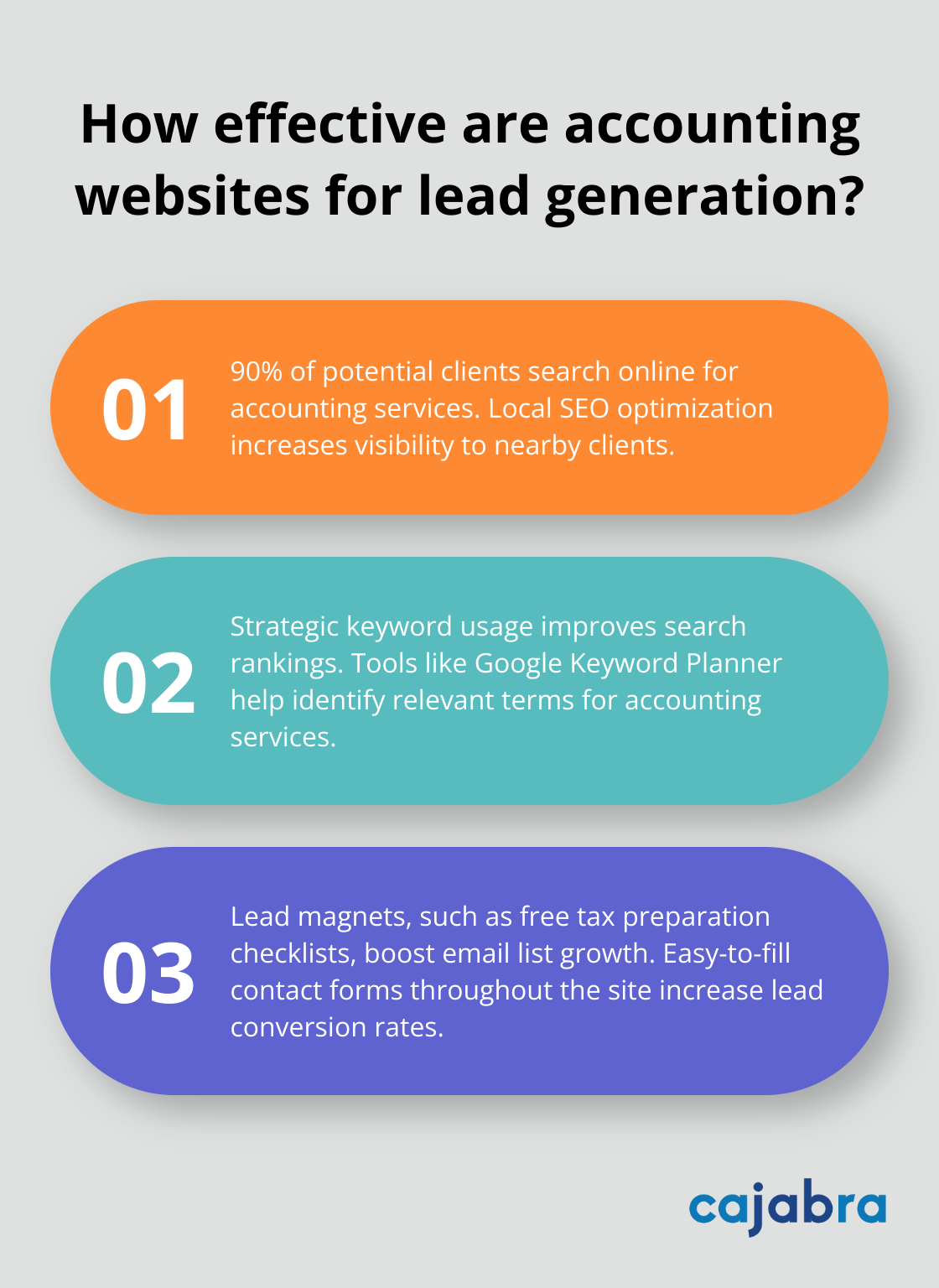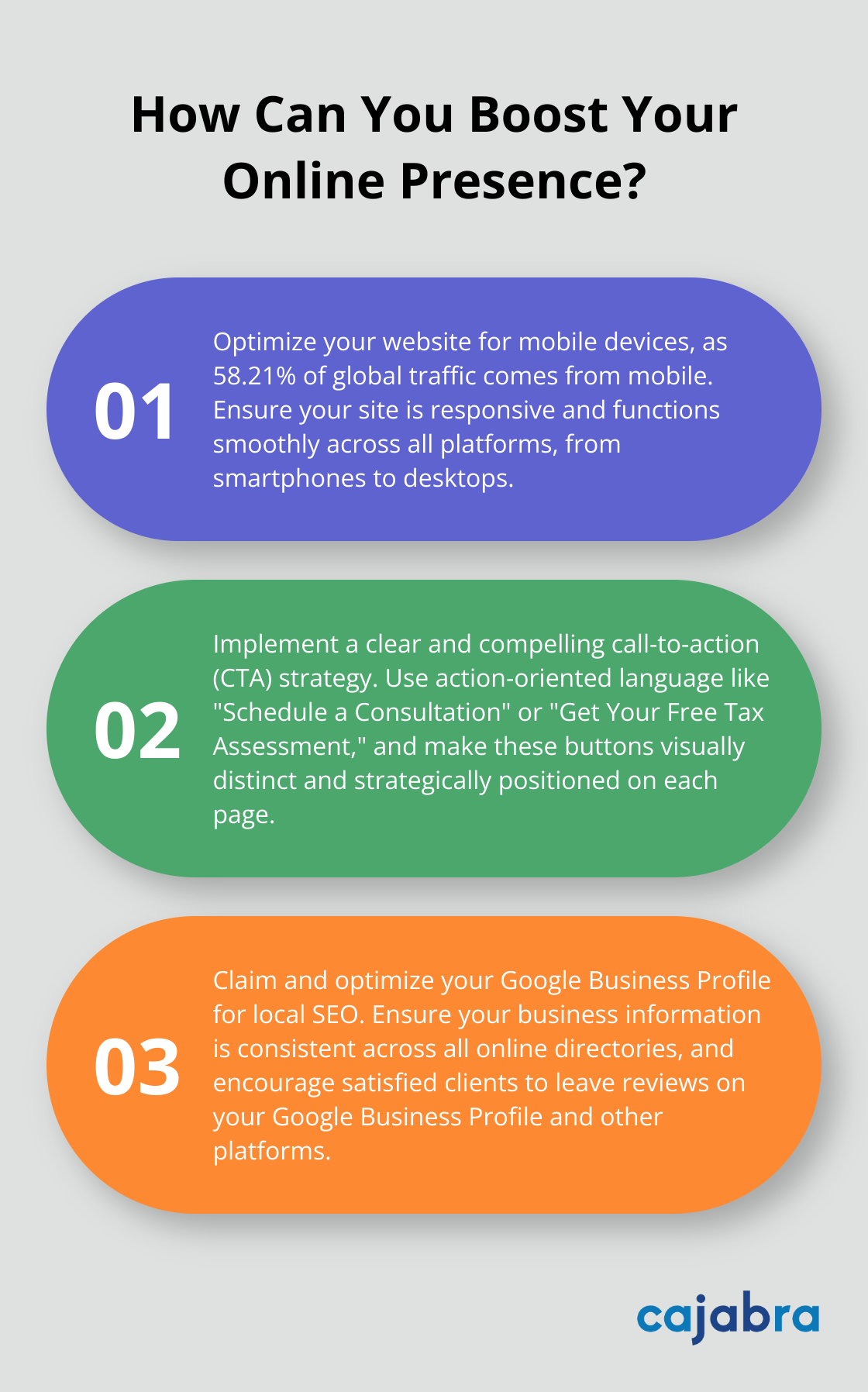
In today's digital landscape, a strong online presence is essential for accounting firms. At Cajabra, LLC, we've seen firsthand how a well-designed website can transform an accounting practice.
This guide will explore the key elements that make up the top 100 accounting websites, helping you create a powerful online platform for your firm. We'll cover everything from design principles to SEO strategies, ensuring your website stands out in a competitive market.
A clear, professional design sets the tone for your accounting website. Your site often provides the first impression potential clients have of your firm. A cluttered or outdated design can repel visitors within seconds. Try to create a clean, modern look that reflects your firm's professionalism. Select a color scheme that aligns with your brand and apply it consistently throughout the site.
User-friendly navigation plays a critical role in website effectiveness. Visitors should locate what they seek in three clicks or less. A well-structured menu with clear labels helps users explore your services effortlessly. Consider adding a search function for larger sites (this can significantly improve user experience). Poor navigation frustrates users and may lead them to seek services elsewhere.
A responsive, mobile-optimized layout is no longer optional. With 58.21% of global website traffic originating from mobile devices, your site must look great and function smoothly across all platforms (from smartphones to desktops). Google's mobile-first indexing now uses your site's mobile version as the benchmark for content indexing, making mobile optimization even more critical.
Strong calls-to-action (CTAs) guide visitors towards becoming clients. Place clear, compelling CTAs throughout your site. Use action-oriented language like "Schedule a Consultation" or "Get Your Free Tax Assessment." Make these buttons visually distinct and position them strategically on each page.
High-quality, relevant content establishes your expertise and builds trust with potential clients. Include informative blog posts, whitepapers, or video tutorials that address common accounting questions and concerns. This not only provides value to visitors but also improves your site's search engine rankings.

Implementing these elements effectively can significantly boost your website's performance. However, creating a high-performing accounting website requires specialized expertise. This is where services like those offered by Cajabra come into play. Their Premium Online Presence Package aims to modernize accounting websites and optimize digital footprints, helping firms stand out in the crowded online space. As we move forward, let's explore the key features you should include on your accounting website to maximize its impact and effectiveness.
Your website must clearly communicate your offerings. Create dedicated pages for each of your primary services. Detail your approach and the benefits clients can expect. If you specialize in tax preparation for small businesses, explain your process, highlight any unique methodologies, and emphasize the time and stress you'll save your clients.
Potential clients want to know who they'll work with. Include a team page with professional photos and bios of your staff. Highlight qualifications and certifications, but also personal interests or community involvement. This approach humanizes your firm and helps potential clients feel more connected.
Results speak louder than words. Include a section for client testimonials and case studies. These provide social proof and demonstrate the real-world impact of your services. When featuring case studies, focus on specific challenges you've helped clients overcome and the measurable results achieved.

You might share how you helped a local restaurant reduce their tax liability through strategic planning, or how your bookkeeping services saved a startup administrative work hours.
Position your firm as a thought leader by providing valuable resources and educational content. This could include blog posts on recent tax law changes, video tutorials on bookkeeping best practices, or downloadable guides on financial planning for small businesses.
The accounting landscape changes constantly. Your website should reflect the most current information and trends. Update your content regularly. This practice not only helps your clients but also boosts your search engine rankings.
These essential features will create a powerful online presence that attracts, engages, and converts potential clients. Now, let's explore strategies for optimizing your site for search engines and maximizing conversions.
Research keywords relevant to your accounting services. Tools like Google Keyword Planner or SEMrush help identify terms potential clients use when searching for accounting services. Incorporate your target keywords naturally into your website's content, headers, and meta descriptions.

For example, if you specialize in small business accounting, target phrases like "small business tax preparation" or "bookkeeping services for startups". Use these keywords in your page titles, headers, and throughout your content. Avoid keyword stuffing, as it can harm your rankings.
Local SEO proves essential for accounting firms. Most clients seek accountants in their area, so optimizing for local search increases your visibility to nearby potential clients.
Claim and optimize your Google Business Profile. Ensure your business name, address, and phone number remain consistent across all online directories. Ask satisfied clients to leave reviews on your Google Business Profile and other platforms (like Yelp).
Create location-specific pages on your website if you serve multiple areas. For instance, if you're based in New York but also serve New Jersey, create separate pages optimized for "New York accounting services" and "New Jersey accounting services".
Transform your website into a lead-generating machine. Implement strategically placed contact forms throughout your site. Make these forms easy to fill out and only ask for essential information.
Offer a lead magnet, such as a free tax preparation checklist or a guide to small business accounting, in exchange for contact information. This provides value to potential clients and helps build your email list for future marketing efforts.
Use analytics tools like Google Analytics to track your website's performance. Monitor key metrics such as bounce rate, time on site, and conversion rate. This data provides valuable insights into user behavior and helps you identify areas for improvement.
Set up goal tracking to measure specific actions (form submissions or downloads of your lead magnet). This allows you to see which pages and content generate leads most effectively.
Try A/B testing. Test different versions of your call-to-action buttons or landing pages to see which performs better. For example, test whether "Get Your Free Consultation" or "Schedule a Tax Review" generates more clicks.
Creating a top-performing accounting website demands careful planning and execution. We explored the essential elements that make up the top 100 accounting websites, from clear design to effective SEO strategies. Your website requires regular updates and maintenance to stay fresh, relevant, and perform at its best.

At Cajabra, we understand the unique challenges accountants face in creating and maintaining a high-performing website. Our specialized marketing services (including our Premium Online Presence Package) help accounting firms stand out in a competitive digital landscape. We handle all aspects of your online presence, from website design to SEO optimization.
Don't let your website hold your firm back. Partner with Cajabra to create a website that ranks among the top 100 accounting websites and drives real results for your business. Let's work together to transform your online presence and take your accounting practice to new heights.



